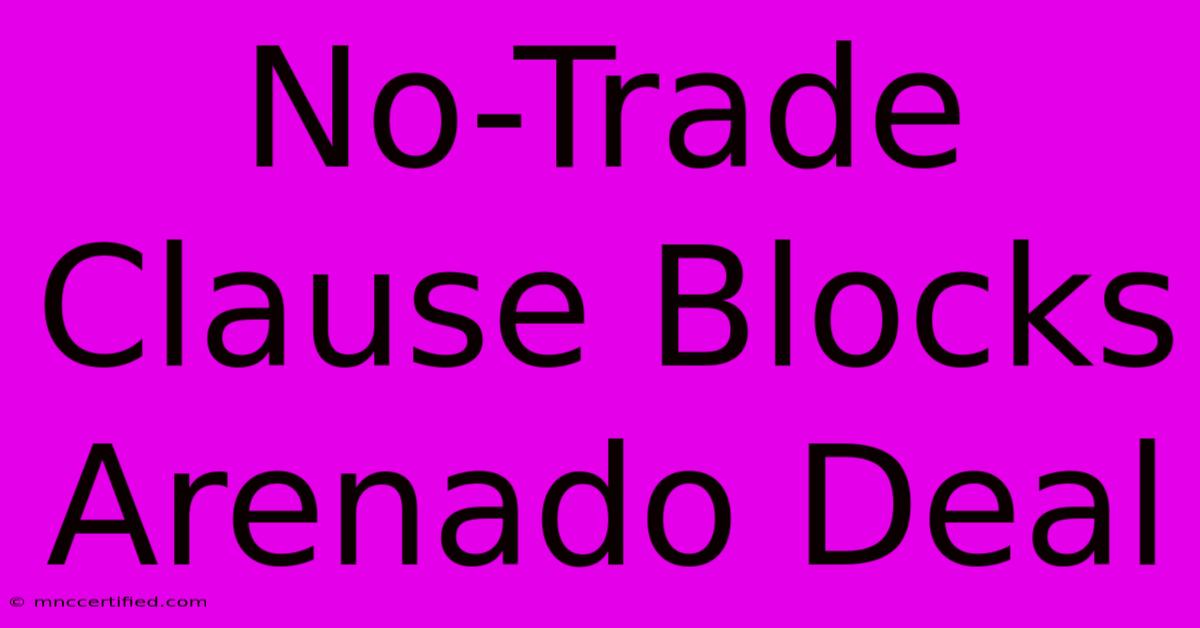No-Trade Clause Blocks Arenado Deal

Table of Contents
No-Trade Clause Blocks Arenado Deal: A Deep Dive into the MLB Negotiation
The recent standstill in negotiations surrounding Nolan Arenado's potential trade highlights the significant impact of no-trade clauses in Major League Baseball (MLB). This seemingly simple contractual provision can dramatically alter the landscape of player transactions, creating both opportunities and obstacles for teams and players alike. This article delves into the intricacies of Arenado's situation, exploring the reasons behind the impasse and analyzing the broader implications of no-trade clauses in MLB.
Understanding Nolan Arenado's No-Trade Clause
Nolan Arenado, a highly sought-after third baseman known for his exceptional defensive skills and consistent offensive production, holds a significant no-trade clause in his contract. This clause grants him substantial control over where he might be traded, essentially giving him a veto power over any potential deal. This isn't unusual for high-profile players; however, the specifics of Arenado's clause and his preferences are proving to be a major stumbling block in negotiations.
The Power Dynamics of No-Trade Clauses
No-trade clauses are powerful tools for players, offering them protection and security. They provide a degree of control over their careers, preventing a forced move to a team they might deem undesirable, whether due to location, team culture, or competitive outlook. However, this power also comes with limitations. Teams are less likely to trade for a player with a no-trade clause, as it adds an extra layer of complexity and risk to the negotiation process. The team acquiring the player must first secure the player's consent, which can significantly impact the deal's feasibility.
The Impasse: Why the Arenado Trade Faltered
Reports suggest that Arenado's no-trade clause has been the primary reason for the stalled negotiations. While multiple teams have expressed interest in acquiring the star third baseman, Arenado's reluctance to waive his no-trade clause for certain teams has effectively ended those potential trades. This highlights the critical role of player preference in these high-stakes transactions.
Beyond the Clause: Other Contributing Factors
Beyond the no-trade clause, other factors might contribute to the difficulty in finalizing a deal for Arenado. These could include:
- Contractual obligations: Arenado's substantial remaining salary could be a deterrent for some teams.
- Team fit: Finding a team that satisfies Arenado's personal and professional preferences is crucial. He might prioritize contending teams with a strong organizational culture.
- Performance expectations: Teams need to be confident that acquiring Arenado will significantly benefit their chances of winning.
The Future of No-Trade Clauses in MLB
The Arenado situation underscores the ever-increasing importance of no-trade clauses in MLB negotiations. As player empowerment grows, we can expect to see more players securing this level of control in their contracts. This will likely lead to more complex and drawn-out trade negotiations, potentially impacting the overall pace of transactions during the offseason and even in-season.
Strategic Implications for Teams
Teams need to adopt more sophisticated strategies when pursuing players with no-trade clauses. This might involve:
- Improved scouting and due diligence: Thoroughly understanding a player's preferences and motivations.
- Enhanced communication: Building strong relationships with player agents to facilitate negotiations.
- Creative contract structures: Exploring ways to incentivize players to waive their no-trade clauses.
Conclusion: The Arenado Saga and its Lasting Impact
The stalled trade negotiations surrounding Nolan Arenado serve as a compelling case study on the influence of no-trade clauses in MLB. While these clauses offer players significant protection, they also introduce considerable complexities for teams seeking to acquire top talent. The situation highlights the evolving power dynamics within the league and the crucial role of player agency in shaping the future of MLB transactions. The outcome of Arenado's situation, whatever it may be, will undoubtedly shape future contract negotiations and trade discussions. We can expect to see more players leveraging their negotiating power to secure similar protections in their future contracts.

Thank you for visiting our website wich cover about No-Trade Clause Blocks Arenado Deal. We hope the information provided has been useful to you. Feel free to contact us if you have any questions or need further assistance. See you next time and dont miss to bookmark.
Featured Posts
-
Teamsters Strike Amazon Amid Holidays
Dec 20, 2024
-
Curry Warriors Suffer Embarrassing Loss
Dec 20, 2024
-
Putin On Ukraine Should Have Invaded Sooner
Dec 20, 2024
-
La Monts Unexpected Survivor 47 Victory
Dec 20, 2024
-
Beast Games Release Date Time Episode Guide
Dec 20, 2024